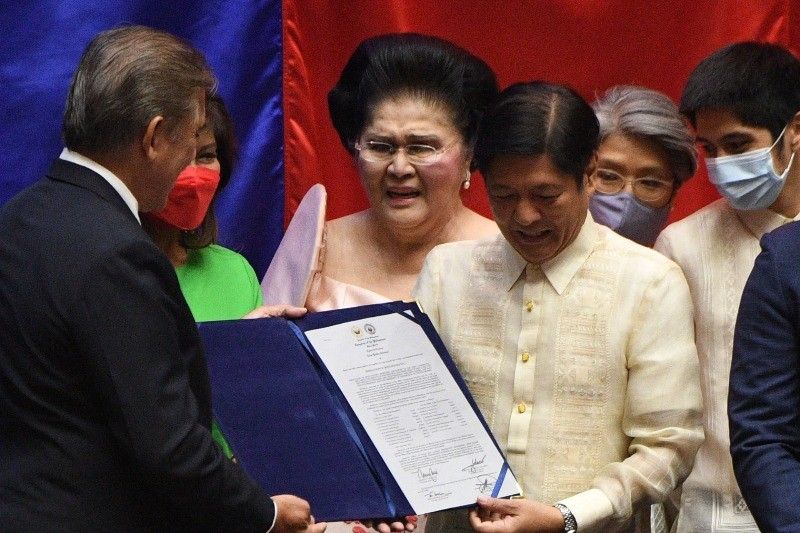Marcos Jr. wary of proposals to collect new taxes

MANILA, Philippines — President-elect Ferdinand Marcos Jr. said Thursday his administration will be “careful” in making any policies meant to bolster government revenues amid proposals to impose new taxes to ease the government’s debt burden.
"If there are too many moving parts, you cannot anticipate what will happen. We have to be careful since there are many variables. Move variables one by one, not simultaneously, then you don’t know what’s happening," Marcos said in a press conference with select members of the press.
"It's difficult for me to answer because I cannot talk about specifics because they will all be part of a larger economic plan," Marcos added. "We just follow, I guess, is the scientific method.”
This was the incoming president’s response to a reporter’s question about the “fiscal consolidation” plan that outgoing economic managers of President Rodrigo Duterte have proposed to make sure that the next administration could pay off the debts that have accumulated during the pandemic.
The three-year plan includes deferment of scheduled personal income tax cuts, limitations to VAT exemptions, and collection of new excise taxes on various commodities, among others.
Overall, the incumbent Department of Finance estimates that the average annual revenue that could be collected from all tax proposals stands at around P349.3 billion. The measures could also bring down debts, as a share of the economy, to 55.4% by 2025, the DOF added.
Typically, collecting new taxes or raising existing ones are deeply unpopular measures for any leader. At the same time, a lot of the tax measures that DOF proposed must be legislated, which could be a very long and tedious process.
But outgoing Finance Secretary Carlos Dominguez III warned that failure to improve state revenues could have devastating impact on the economy. At this point, Dominguez said inaction on fiscal consolidation could prompt Marcos to either increase borrowings or temper spending in order to narrow a large budget deficit — which are both “painful” options for the economy.
But Marcos had something else in mind.
In the same press conference on Thursday, the president-elect said he intends to reduce tax collections on pandemic-hit businesses to help them recover. "I will give a tax holiday or amnesty. We're studying that now," he said.
Jun Neri, lead economist at Bank of Philippine Islands, raised concerns over Marcos’ plan. "His economic team should check the risks of revenue erosion first. Credit rating agencies are watching these carefully," Neri said in a Viber message.
For Leonardo Lanzona, an economist at Ateneo De Manila University, the plan to give tax relief would only work if these businesses are still alive in the first place. "Since a lot of these MSMEs have closed, there are no taxes to collect," Lanzona said.
‘Too early’
At a press briefing also on Thursday, Benjamin Diokno, who would cut short his stint as central bank governor to become Marcos’ finance chief, said it is still too early to tell if there’s a need to collect new taxes or raise existing ones.
Diokno also said he would retain most undersecretaries at the DOF and National Treasurer Rosalia De Leon to ensure policy continuity.
“My own sense is that our tax system is stronger than the tax system we inherited from the previous administration. This government (Duterte administration) has done a lot of reforms. I’m not saying it’s perfect, there are areas we can improve upon but to me the focus should be on tax administration,” he said.
As of first quarter, state obligations as a share of gross domestic product already stood at 63.5% -- breaching the 60% threshold deemed manageable by international debt watchers. It was also the highest debt-to-GDP level since 2005, the year when the Arroyo administration introduced the expanded value-added tax (EVAT) to trim high foreign debts at the time.
For Diokno, the government can grow out of its debts if the economy could sustain a 6-7% growth in the next years.
“That said, it is important that I look at the sustainability of the debt. Of course, that is to assure everybody — domestic audience and our international credit watchers — that we’re serious about consolidating our fiscal resources so that we’re able to reduce our debt and deficit to GDP ratio over time,” he added.
- Latest
- Trending

























